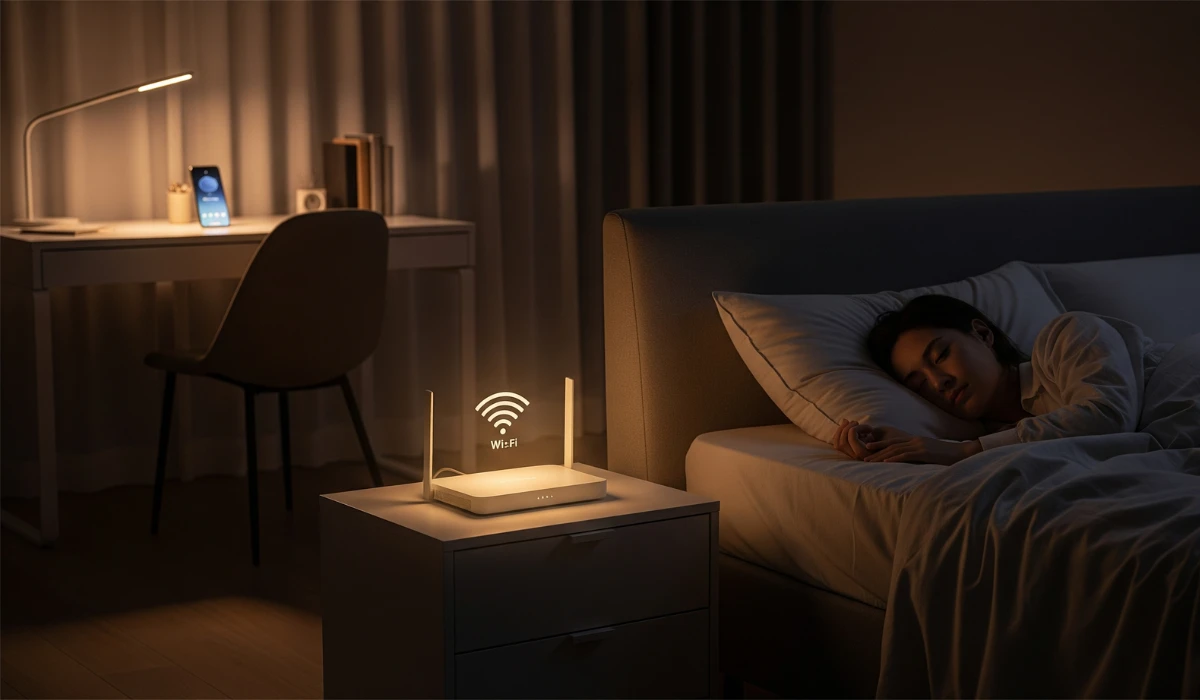The WiFi Radiation and Sleep Connection: Fact or Fiction?
The concern isn’t new. A few years ago, 5G sparked similar fears—claims it harmed birds or even caused cancer made headlines. Those theories fizzled out due to a lack of solid evidence.
Now, WiFi radiation is under scrutiny, with some reports suggesting it could increase brain activity during sleep or trigger insomnia-like symptoms. But what does science say?
According to the World Health Organization (WHO) and the International Commission on Non-Ionizing Radiation Protection (ICNIRP), WiFi emits low-level, non-ionizing radiation that’s well below safety thresholds.
Studies, like those reviewed by ICNIRP, show no consistent evidence that WiFi’s radiofrequency electromagnetic fields (RF-EMF) disrupt sleep patterns or harm health. In fact, WiFi’s radiation levels are far lower than what’s needed to cause biological effects. So, why are people still worried?
The Real Culprit Behind Poor Sleep
If WiFi isn’t the villain, what’s keeping you up at night? Experts point to a more likely suspect: excessive screen time. Staring at smartphones, laptops, or tablets before bed can mess with your body’s melatonin production, the hormone that regulates sleep.
The blue light from screens tricks your brain into thinking it’s daytime, delaying sleep onset. Add in the mental stimulation from scrolling social media or answering late-night emails, and it’s no wonder you’re tossing and turning.
There’s also something called the nocebo effect at play. This happens when you believe something like WiFi radiation is harming you, and that worry itself causes symptoms like sleeplessness.
For example, if you’re convinced your router is disrupting your sleep, the stress of that thought might keep you awake, not the radiation itself. It’s a classic case of the mind playing tricks on the body.
Should You Turn Off Your WiFi at Night?
Some suggest switching off your WiFi router at night to reduce radiation exposure. But here’s the catch: it might do more harm than good. Many smart devices like security cameras, smart thermostats, or even your fridge rely on constant WiFi to function.
Disconnecting them could disrupt automated tasks or updates, leaving you with a bigger headache than a restless night. Plus, studies show that WiFi’s low-level radiation doesn’t significantly affect sleep, so turning it off might not solve the problem anyway.
Practical Tips for Better Sleep
Instead of blaming WiFi, focus on proven ways to improve your sleep quality:
-
Limit Screen Time : Avoid smartphones, tablets, and laptops at least an hour before bed to let melatonin do its job.
-
Create a Sleep-Friendly Environment : Keep your bedroom dark, cool, and quiet. Consider blackout curtains or a white noise machine.
-
Stick to a Routine : Go to bed and wake up at the same time every day to regulate your body’s internal clock.
-
Manage Stress : If you’re worried about WiFi or other health concerns, try relaxation techniques like deep breathing or meditation to calm your mind.
The Bottom Line
WiFi radiation as a sleep disruptor? The evidence says it’s unlikely. Reputable organizations like WHO and ICNIRP confirm that WiFi’s low-level radiation is safe and doesn’t interfere with sleep. If you’re struggling to catch those Z’s, look at your screen habits or stress levels before pointing the finger at your router.
Keep your WiFi on, put your phone away, and focus on building healthy sleep habits. You’ll likely wake up feeling refreshed without changing a thing about your internet setup.














